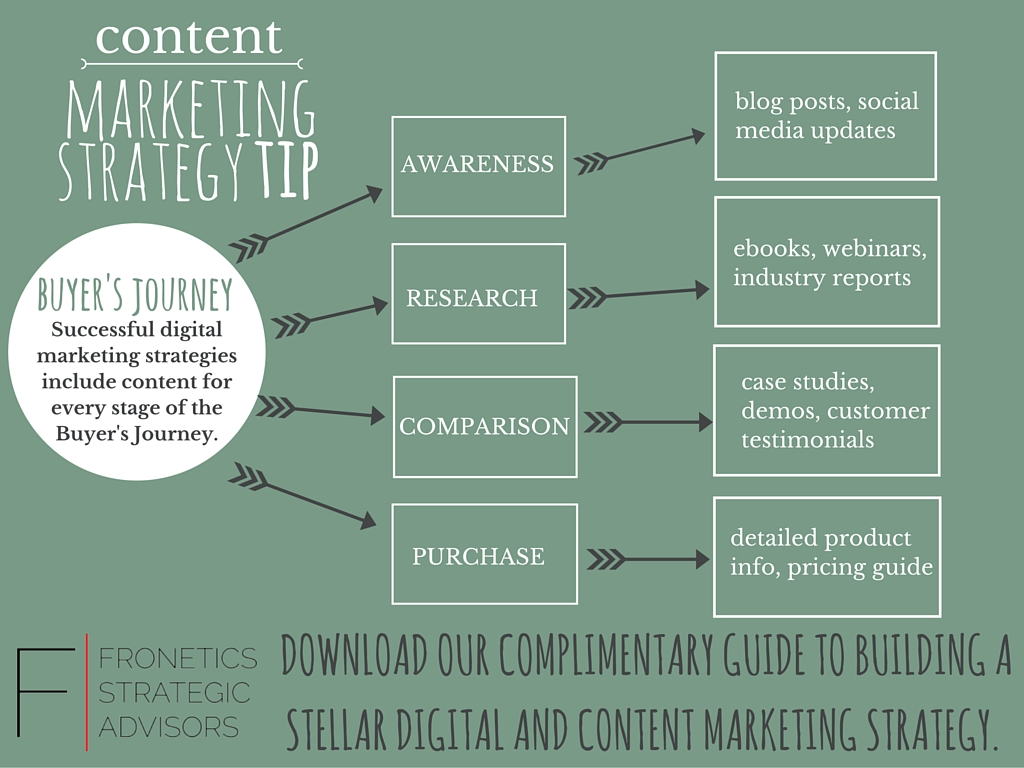
by Fronetics | Feb 9, 2016 | Blog, Content Marketing, Leadership, Marketing, Strategy

Identifying content spokespeople outside of executive management can improve the product and alleviate C-suite stress.
Often people think they’re the only ones who can do their job or, at the very least, that they’re the ones who have been doing it and know it best. And some C-suite executives forget the people working around them — when, in fact, those are the very employees who could help them do their jobs better.
Joe Fuld, president of political and advocacy advertising agency The Campaign Workshop in Washington, D.C., has wise words on the subject: “As a business owner, I like to think that the business has a lot to do with me, but I have realized it has just as much to do with the people who work with me.”
Months ago I asked an account manager to be on a call with me to discuss an editorial calendar with a client. She was new to the account, so I thought it would be beneficial for her to listen in. A half-hour into the call, I saw her notepad with at least 20 new ideas for articles, white papers, and blog posts. By the end of the meeting, the list had grown to 40, and they weren’t just simple ideas — they were complex, thoughtful, and fresh. This wasn’t her role, but she dove in and helped to create the strongest editorial calendar to date. The client was pleased; I was thrilled.
The same experience can be true for a management team Strategically identified content spokespeople assisting senior management could help alleviate some of the stress C-suite executives face — and add new ideas to the pot.
Senior management are often extremely busy and may not be hearing the breadth of information and news that some of the lower-level professionals are exposed to. It’s true that too many cooks in the kitchen can spoil the meal, but, if chosen strategically, employees acting as content spokespeople could make your life easier and make the product better. Their investment and loyalty could also grow immensely.
John Hall, CEO of Influence & Co, writes about the subject in the Harvard Business Review. Here are his two suggestions on how to find the right people to fill the role of content spokespeople.
Identify content spokespeople
Identify employees who are comfortable teaching and demonstrate natural leadership qualities. The account manager mentioned earlier is the perfect example: engaging, patient, knowledgeable, curious, professional, trustworthy, and tactful. Her efforts always appear to be helpful, instead of boastful or misplaced.
Assess knowledge base
Hall suggests gathering and documenting information from content spokespeople. He does this by a Q&A process and brain dump exercises. He suggests keeping this information in a central location — a knowledge bank — for future use. From the knowledge bank content can be gathered and synthesized into an article or blog.
Hall says that the risk is minimal, since the C-suite can always have final editing power, so even if a content spokesperson says something off-color, the information won’t get out to the customers.
The involvement and collaboration in this process is incredibly valuable for everyone involved. Hall claims, “By embracing the unique experiences of your employees outside the C-suite and showcasing their diversity through thought leadership content, you’re strengthening your brand’s authentic, human connection to your audience.”
Related posts:

by Fronetics | Jan 28, 2016 | Blog, Logistics, Supply Chain
Fronetics names the best of the best blogs in the logistics and supply chain industries.
The logistics and supply chain industries are catching on to how successful a blog can be as part of an inbound marketing strategy. Companies are creating content that not only fuels conversation about industry best practices, trends, and issues, but also helps drive business to their websites.
Fronetics Strategic Advisors conducted a survey in January 2016 to determine the top logistics and supply chain blogs in the industry. Here are the results:

Dallas, TX-based Transplace is a 3PL and technology provider serving manufacturers, retailers, and consumer and chemical packaged goods companies. Logistically Speaking is the company’s thought leadership blog. It tells “the latest and the greatest supply chain and transportation stories” through Infographics, interviews with logistics executives, and informative articles offering information and advice.
Readers love: the weekly “TIP list,” or Transportation Industry’s Progression, which curates a short list of articles concerning trending topics and advancements in the industry
 Transplace’s CEO Tom Sanderson shares information, opinions, and analysis of factors affecting the supply chain — including company economic data, freight transportation regulation and legislation, and carrier and 3PL financial performance. The blog is rich with charts and graphs that offer big-picture insight on what’s going within the industry.
Transplace’s CEO Tom Sanderson shares information, opinions, and analysis of factors affecting the supply chain — including company economic data, freight transportation regulation and legislation, and carrier and 3PL financial performance. The blog is rich with charts and graphs that offer big-picture insight on what’s going within the industry.
Readers love: Sanderson’s no-nonsense breakdown of the most pressing issues facing the supply chain
Jennifer Cortez, Director, Marketing Communications, is thrilled with Transplace being recognized by Fronetics and the industry:
“We are thrilled to be recognized as the top logistics and supply chain blogs in 2015. At Transplace, we pride ourselves on providing timely and relevant content to our customers and the industry. Our goal this year is to further connect Transplace and our thought leaders with emerging industry trends.”
Procurious is a UK-based online business network with news, education, discussion forums, and events for procurement and supply chain professionals. The blog goes beyond industry insights — it’s a savvy guide to career advancement and skill development. Articles are written for the modern-day professional, in sync with Procurious’s forward-thinking brand.
Readers love: original series like Life & Style and #firstmovers, which cover interesting, relevant topics in the procurement world.
Thank you to all who took our survey to find the top logistics and supply chain blogs!
Fronetics Strategic Advisors is a management consulting firm with a focus on inbound marketing. We create and execute successful strategies for growth and value creation. Unlike other firms, our approach is data driven. We know ROI is important, so we track and measure results to drive success. Read about our approach to inbound marketing, or get in touch.

by Fronetics | Jan 4, 2016 | Blog, Logistics, Marketing, Social Media, Supply Chain
 Companies within the logistics and supply chain industries are revolutionizing their marketing strategies by leveraging social media. They are using blogs, in particular, to establish their position as thought leaders and to drive business to their sites.
Companies within the logistics and supply chain industries are revolutionizing their marketing strategies by leveraging social media. They are using blogs, in particular, to establish their position as thought leaders and to drive business to their sites.
Fronetics is, once again, looking to uncover the top industry blog of 2015. We need your help by voting for your favorite blog in the logistics and supply chain industries. Vote here! Answers will be collected through January 15, 2016.
See last year’s top blog and honorable mentions!
Your nominations are confidential and will be reported in aggregate with no identifiable information (individual or company) attached. Please contact [email protected] with any questions.

by Fronetics | Nov 4, 2015 | Blog, Content Marketing, Marketing, Supply Chain
3 things supply chain hiring managers should look for when hiring a copywriter.
Since 94% of domestic B2B buyers conduct research online to make purchase decisions, maintaining high-quality content on your company’s website is crucial for attracting new business. But who has time for web upkeep, much less for the generation of new blog posts, emails, and various other content? Enter the copywriter.
An effective copywriter can help drive consumers to your website, convince them of the quality of your products/services, and ultimately help convert those leads into customers. A lot of writers can do one of these functions. The gold standard, of course, is a copywriter with a proven track record in all three functions.
How do you know if a copywriter will be effective for your business? Here are a few specific skills and experiences supply chain hiring managers should look for in a potential hire:
Someone who understands SEO.
An SEO-savvy copywriter can impact your business by increasing the number of visitors (i.e., potential customers) to your site. That’s because 77% of today’s buyers use Google to research information about products.
A copywriter trained in search engine optimization (SEO) knows how to write and format your site so it gets prioritized by Google in web queries for your products. Three of four people will click on the top five search results. So the closer you can be to those top five results, the better your chances at driving a buyer to your site. That’s a crucial first step in converting that lead into a new customer.
Look for SEO training or experience on a potential copywriter’s resume. And ask for any metrics illustrating how his/her search-engine-optimized content has increased organic traffic to a client’s website. A copywriter who understands SEO can help achieve the same result for you over time.
Someone who understands branding.
Sure, it’s great if you can find a copywriter with experience in the supply chain — the vocabulary and industry knowledge are already in place. But, likely, a solid writer who has developed content for a variety of industries has the technical skills and resourcefulness to get up to speed quickly.
Consider the value of a candidate who also has marketing writing and branding experience. This person has the know-how to create content driven by your business objectives and a mind for strategy that can promote your image among consumers and other businesses.
A 2015 global study on B2B branding has shown its positive impact on the perceived quality of a product and creation of new market opportunities. Branding instills confidence and trust among consumers.
The marketing copywriter can craft a consistent, compelling brand narrative across all of your digital channels. That means your website, blog posts, white papers, social media, emails, etc., will work together to solidify and enhance your business’s reputation in the marketplace, which will serve you beyond any individual campaign.
Someone who understands user experience.
User experience plays a vital role in conversion: the more positive the customer’s interaction with your business, the more motivated s/he will be to purchase from you. Additionally, Gartner Research estimates that by 2020 customers will manage 85% of their relationship without talking to a human. That means your web content will bear most of the user-experience burden.
A copywriter who understands user experience anticipates what buyers are seeking at any given point on your website and adjusts the copy so that the answer is clear and easy to find. Paragraphs of dense, technical copy on a product page could easily turn a buyer away, for example. A well-placed, well-written call-to-action, however, could lead to a purchase.
To find a copywriter who understands user experience, look for content that is not only polished, but also helpful, persuasive, and, above all, accessible. Writing samples should reflect where in the sales cycle a user would encounter it. That candidate could play a vital role in helping you convert leads into customers.
Hiring a copywriter represents an opportunity to bring someone on board who can do more than produce content: they can help achieve your business goals.
Related posts:

![How to create an effective content strategy [Template]](https://fronetics.com/wp-content/uploads/2024/10/content-strategy-1024x675.jpg)
by Fronetics | Oct 26, 2015 | Blog, Content Marketing, Marketing, Strategy
With 3 out of 4 marketers across the globe prioritizing content marketing, producing unique content to attract and convert website visitors can be tough. From social media to blog posts to ebooks and webinars, buyers are accessing your content through a myriad of channels. The amount and frequency of content to create can be dizzying. Fortunately, by starting with a solid strategy you can assure your content flows freely and your marketing content stands out.
One key element of any successful content strategy is mapping your buyer’s journey. Considering the path of purchase of current customers can give you valuable insight into the stages that a lead goes through before becoming a customer. Typically, buyers follow a track that looks something like this: awareness, research, consideration, and purchase. Knowing your buyer’s journey can inform your decisions about what kinds of content will resonate with your prospects and which channels of distribution will be most successful connecting them to your content.

Of course, just mapping out your Buyer’s Journey won’t lead to content marketing success. It’s certainly important, but it should be one component in your overall strategy. Start building a comprehensive content strategy that includes goal setting, developing buyer personas, setting keywords, and brainstorming content topics by using our free Content Strategy Template. You’ll be well on your way to creating great content and attracting even better leads.

You may also like:
Fronetics Strategic Advisors is a leading management consulting firm. Our firm works with companies to identify and execute strategies for growth and value creation.
We advise and work with companies on their most critical issues and opportunities: strategy, marketing, organization, talent acquisition, performance management, and M&A support.








![How to create an effective content strategy [Template]](https://fronetics.com/wp-content/uploads/2024/10/content-strategy-1024x675.jpg)

